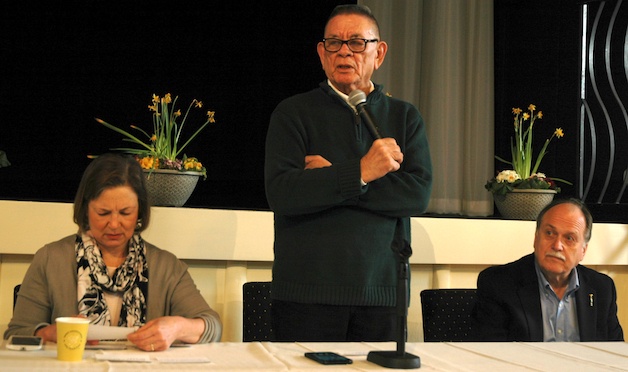MARYSVILLE — Attendees of the 38th District town hall at the Marysville Opera House Feb. 20 were told two things by their legislators; the state still isn’t adequately funding education because it’s not possible to raise sufficient revenue.
“Our tax system is broken,” Rep. June Robinson said. “I know everyone feels like they’re paying a lot in taxes already, but it’s not enough money.”
Robinson agreed state sales taxes are “fairly high,” but asserted that sales taxes are only effective when people purchase goods rather than services, which aren’t subject to such taxes.
“It doesn’t work when we’re in a recession, or even as the economy is starting to move out of a recession,” said Robinson, who also acknowledged that the tax system is “convoluted” for the number of different rates. “There’s no simple fix. Anything we do will affect all of us.”
Sen. John McCoy described the most recent budget measures as “kicking the can down the road” and “robbing Peter to pay Paul.” He encouraged citizens to submit suggestions for generating revenue, and promised they would at least be considered, but warned that the time to take action is short.
“We will have to do something about this by next year,” McCoy said. “We don’t have any more wiggle room.”
Rep. Mike Sells advocated in favor of increased pay to address the teacher shortage, but admitted that it cost close to $1 billion simply to try and reduce K-3 class sizes.
“We have public employees who haven’t received any [Cost Of Living Adjustment] increases in eight years,” Sells said.
Although McCoy is no longer a tribal employee, he fielded questions about the Tulalip Tribes, pointing out that the tribes have voluntarily contributed as many as $2 million each of the past eight years to the Marysville School District, and clarifying that Tulalip Heritage High School is part of the Marysville district.
Robinson addressed homelessness, which she attributed to factors ranging from a sluggish economy and lack of affordable housing to substance abuse and untreated mental health issues. Like many local elected officials, she held up Utah’s commitment to provide housing as an essential first step.
“How realistic is it that people are going to get treatment for their addictions or other problems if they don’t have a roof over their heads?” Robinson said. “Your tax dollars are already paying for these people’s problems, because of how much it costs to put them in jails or hospitals.”
McCoy added that Snohomish County is piloting a program to train first responders to identify drug users and the mentally ill, so they can be sent to temporary triage centers instead, and progressively be guided toward financial and housing independence.
“We’re wasting money going into the countries where these drugs come from, when what we should be doing is stopping the demand,” McCoy said.
Robinson moved onto Boeing, and conceded that giving the company “the largest tax breaks in state history” had not prevented them from outsourcing jobs to other states.
She’s since sponsored legislation to hold Boeing accountable for keeping jobs in Washington, but has met with resistance in the House.
Even closer to home, McCoy clarified his stance on guns, in the wake of the 2014 shooting at Marysville-Pilchuck High School.
“In terms of selling guns, I believe in background checks,” McCoy said. “If you have a history of mental health issues or violent activity, you shouldn’t own a gun. But I never said we should take people’s guns away.”
McCoy concluded his remarks by proposing a state income tax to solve Washington’s revenue problem, even as he conceded how unlikely it was to be implemented.
“The last time we tried to pass it, the message that resonated with voters was, ‘They want to keep you from becoming the One Percent,'” McCoy said. “What we actually want is for everyone to share in the governance of this state. That’s why, if it’s going to happen, you the people need to start an initiative for it.”



